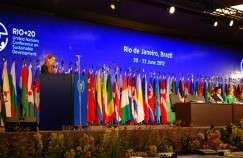The climate negotiation process occurring through the United Nations Framework Convention on Climate Change (UNFCCC) and its related agreements is the primary forum for international cooperation on stabilizing atmospheric greenhouse gas concentrations at a level that would prevent catastrophic anthropogenic interference with the climate system. The Kyoto Protocol to the UNFCCC, adopted in 1997 and entered into force in 2005, imposes emissions reduction and limitation obligations on industrialized country Parties. The Paris Agreement to the UNFCCC, which was adopted in 2015 and rapidly entered into force in 2016, commits all states to take climate action on the basis of equity and to keep global temperature increase below 1.5°C.
The UNFCCC negotiation process is focused on long-term cooperative action to address climate change. This shared vision requires ambitious mitigation and adaptation action coupled with enhanced financial support to make it possible. Human rights are affected by both climate change itself and actions to combat it, making them vital to address within the UNFCCC. The Paris Agreement explicitly recognized that the existing human rights obligations of Parties to the Paris Agreement should be fully respected, promoted, and considered in all climate change-related activities.
CIEL coordinates a core group of organizations focused on these issues and continues to contribute to interventions, policy advocacy, and submissions to support eight core principles in climate action: human rights, participation, indigenous peoples, just transition, gender equality, ecosystem integrity and protection of biodiversity, intergenerational equity, and food security. Additionally, we promote participation and transparency in the process and provide support to civil society organizations and a diversity of constituencies in their ongoing dialogues with the UNFCCC Secretariat to build a more robust international climate regime to address the climate crisis.






